Leadership and Management Module: Skills, Development, and Experience
VerifiedAdded on 2023/06/08
|12
|3856
|368
Report
AI Summary
This report provides a comprehensive analysis of leadership and management, emphasizing the skills required for successful leadership, the potential for leadership development, and the key differences between leadership and management roles. It explores essential qualities such as communication skills, vision, empathy, accountability, and gratitude that define successful leaders. The report discusses how leadership skills can be developed through discipline, taking on more projects, learning to follow, developing situational awareness, inspiring others, continuous learning, empowering teammates, and resolving conflicts. Furthermore, it distinguishes leadership from management based on vision, organizing versus aligning, differences in queries, and the nature of position versus quality. The report also includes personal reflections on the insights gained from a leadership and management module, highlighting the practical application of theoretical concepts.
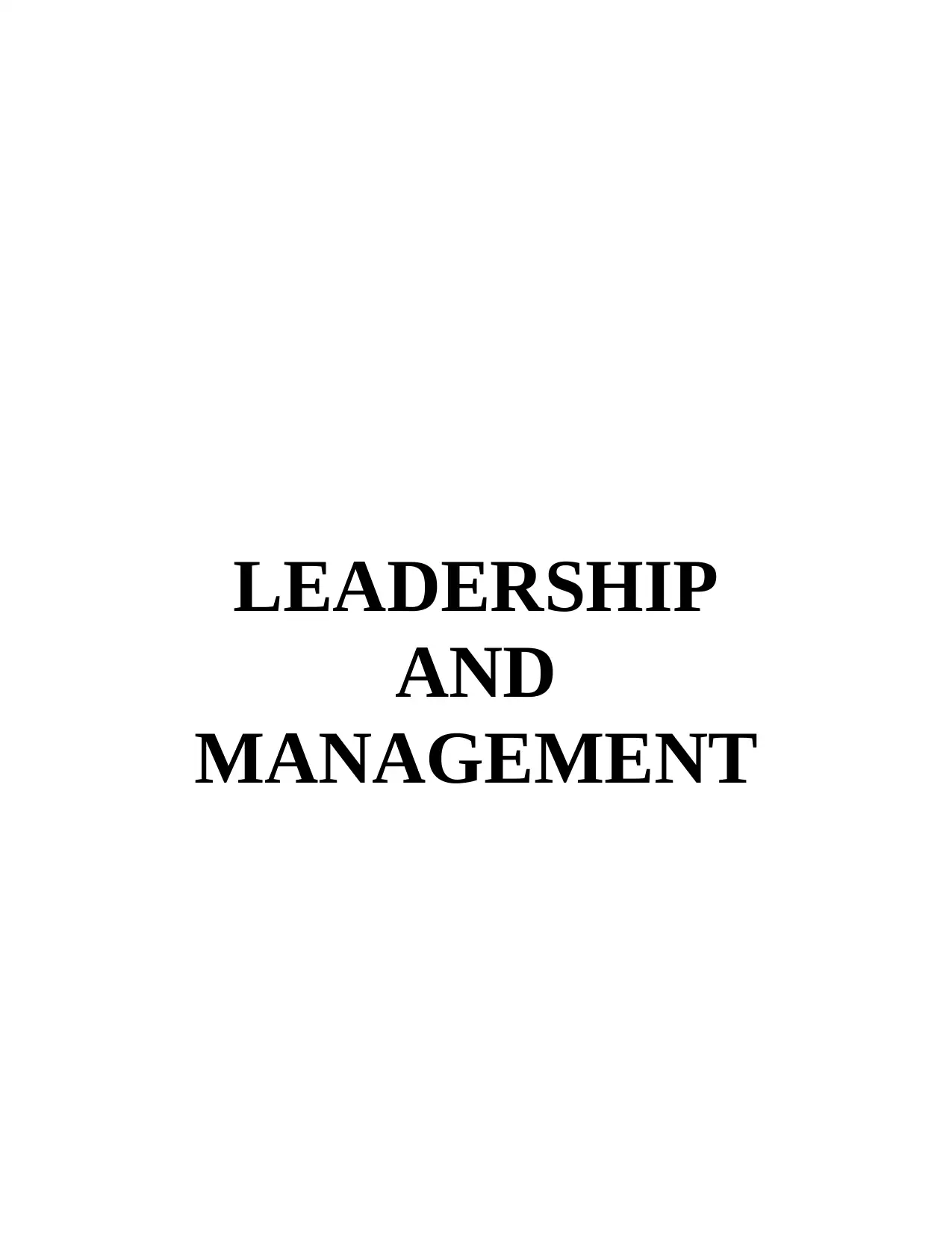
LEADERSHIP
AND
MANAGEMENT
AND
MANAGEMENT
Paraphrase This Document
Need a fresh take? Get an instant paraphrase of this document with our AI Paraphraser
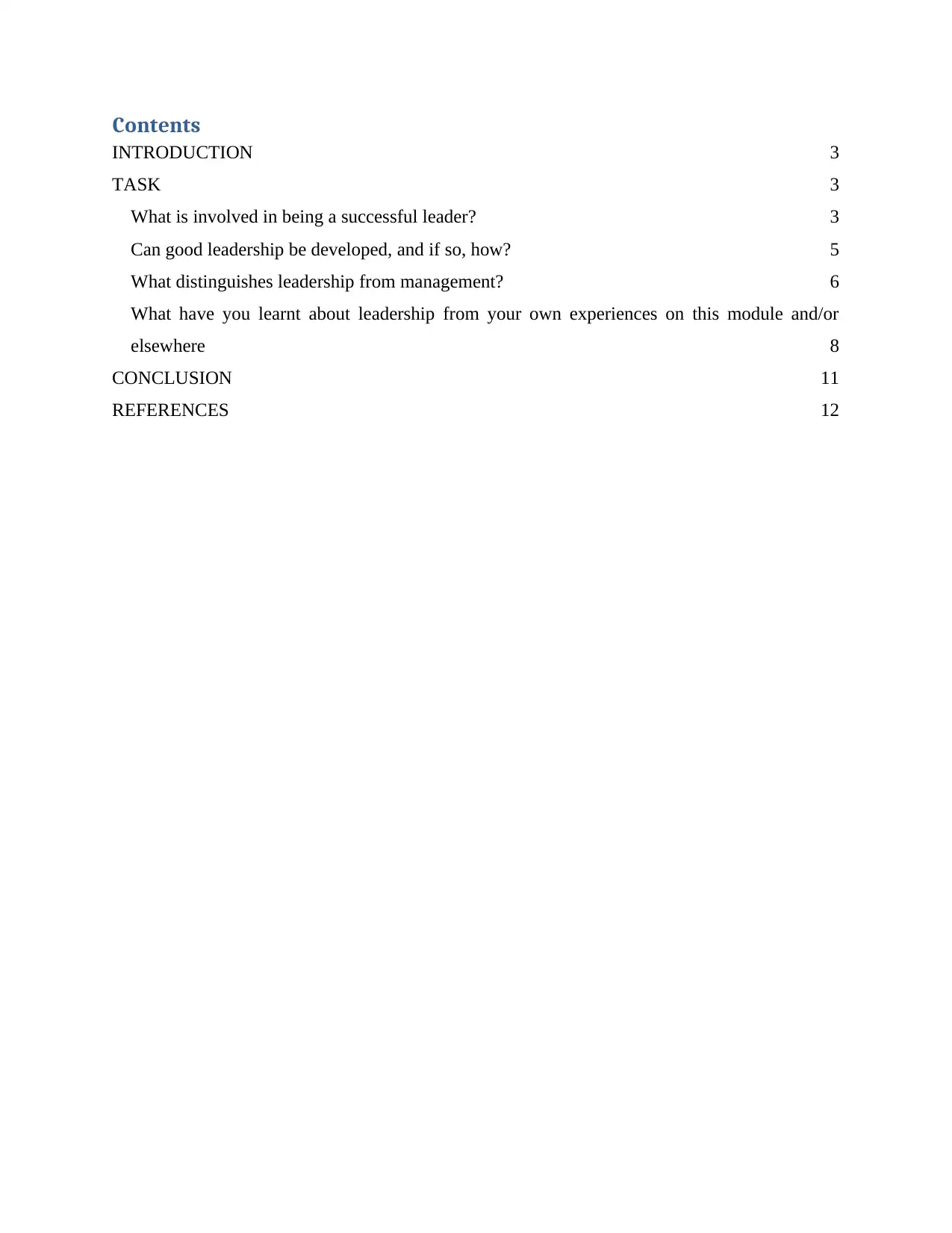
Contents
INTRODUCTION 3
TASK 3
What is involved in being a successful leader? 3
Can good leadership be developed, and if so, how? 5
What distinguishes leadership from management? 6
What have you learnt about leadership from your own experiences on this module and/or
elsewhere 8
CONCLUSION 11
REFERENCES 12
INTRODUCTION 3
TASK 3
What is involved in being a successful leader? 3
Can good leadership be developed, and if so, how? 5
What distinguishes leadership from management? 6
What have you learnt about leadership from your own experiences on this module and/or
elsewhere 8
CONCLUSION 11
REFERENCES 12
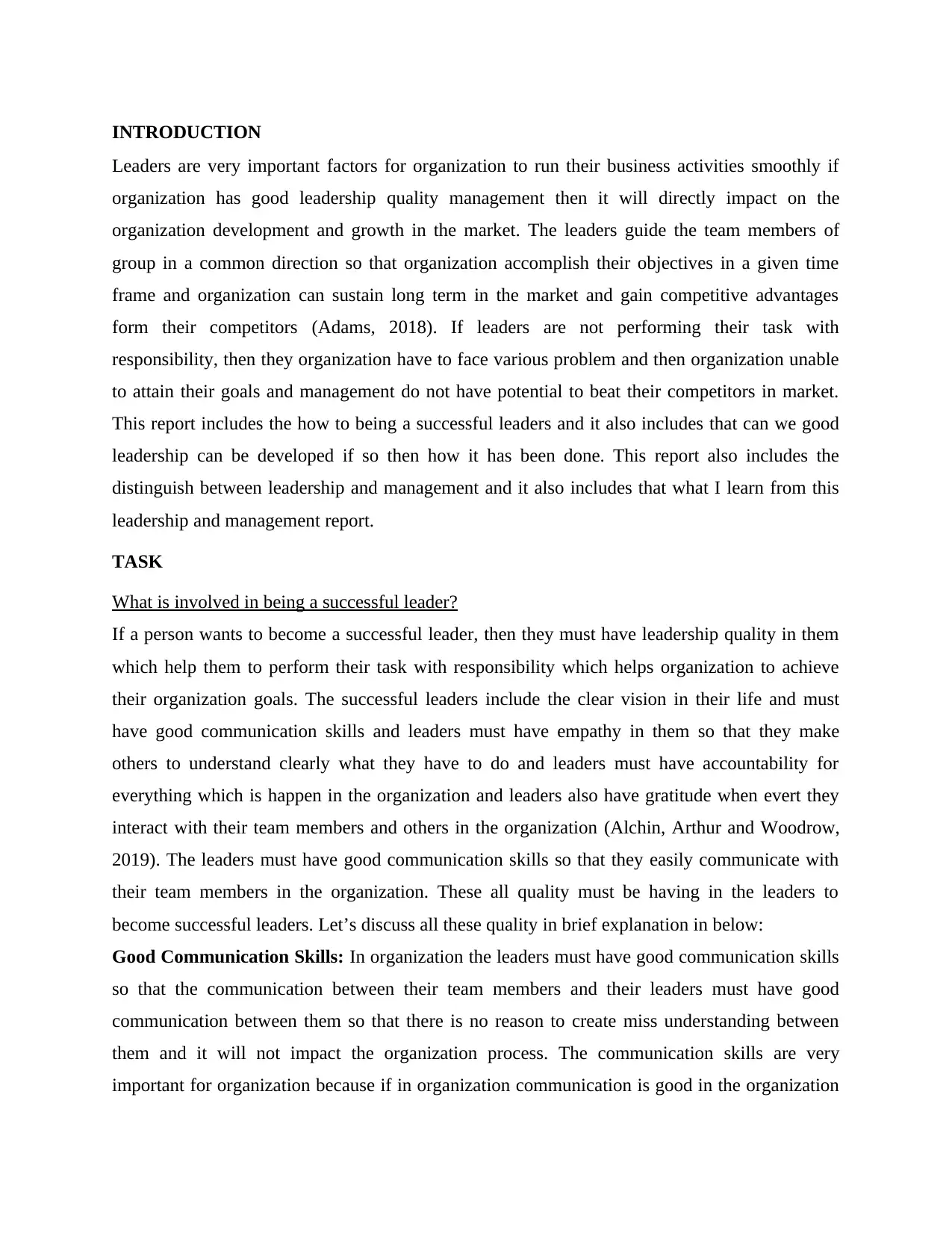
INTRODUCTION
Leaders are very important factors for organization to run their business activities smoothly if
organization has good leadership quality management then it will directly impact on the
organization development and growth in the market. The leaders guide the team members of
group in a common direction so that organization accomplish their objectives in a given time
frame and organization can sustain long term in the market and gain competitive advantages
form their competitors (Adams, 2018). If leaders are not performing their task with
responsibility, then they organization have to face various problem and then organization unable
to attain their goals and management do not have potential to beat their competitors in market.
This report includes the how to being a successful leaders and it also includes that can we good
leadership can be developed if so then how it has been done. This report also includes the
distinguish between leadership and management and it also includes that what I learn from this
leadership and management report.
TASK
What is involved in being a successful leader?
If a person wants to become a successful leader, then they must have leadership quality in them
which help them to perform their task with responsibility which helps organization to achieve
their organization goals. The successful leaders include the clear vision in their life and must
have good communication skills and leaders must have empathy in them so that they make
others to understand clearly what they have to do and leaders must have accountability for
everything which is happen in the organization and leaders also have gratitude when evert they
interact with their team members and others in the organization (Alchin, Arthur and Woodrow,
2019). The leaders must have good communication skills so that they easily communicate with
their team members in the organization. These all quality must be having in the leaders to
become successful leaders. Let’s discuss all these quality in brief explanation in below:
Good Communication Skills: In organization the leaders must have good communication skills
so that the communication between their team members and their leaders must have good
communication between them so that there is no reason to create miss understanding between
them and it will not impact the organization process. The communication skills are very
important for organization because if in organization communication is good in the organization
Leaders are very important factors for organization to run their business activities smoothly if
organization has good leadership quality management then it will directly impact on the
organization development and growth in the market. The leaders guide the team members of
group in a common direction so that organization accomplish their objectives in a given time
frame and organization can sustain long term in the market and gain competitive advantages
form their competitors (Adams, 2018). If leaders are not performing their task with
responsibility, then they organization have to face various problem and then organization unable
to attain their goals and management do not have potential to beat their competitors in market.
This report includes the how to being a successful leaders and it also includes that can we good
leadership can be developed if so then how it has been done. This report also includes the
distinguish between leadership and management and it also includes that what I learn from this
leadership and management report.
TASK
What is involved in being a successful leader?
If a person wants to become a successful leader, then they must have leadership quality in them
which help them to perform their task with responsibility which helps organization to achieve
their organization goals. The successful leaders include the clear vision in their life and must
have good communication skills and leaders must have empathy in them so that they make
others to understand clearly what they have to do and leaders must have accountability for
everything which is happen in the organization and leaders also have gratitude when evert they
interact with their team members and others in the organization (Alchin, Arthur and Woodrow,
2019). The leaders must have good communication skills so that they easily communicate with
their team members in the organization. These all quality must be having in the leaders to
become successful leaders. Let’s discuss all these quality in brief explanation in below:
Good Communication Skills: In organization the leaders must have good communication skills
so that the communication between their team members and their leaders must have good
communication between them so that there is no reason to create miss understanding between
them and it will not impact the organization process. The communication skills are very
important for organization because if in organization communication is good in the organization
⊘ This is a preview!⊘
Do you want full access?
Subscribe today to unlock all pages.

Trusted by 1+ million students worldwide
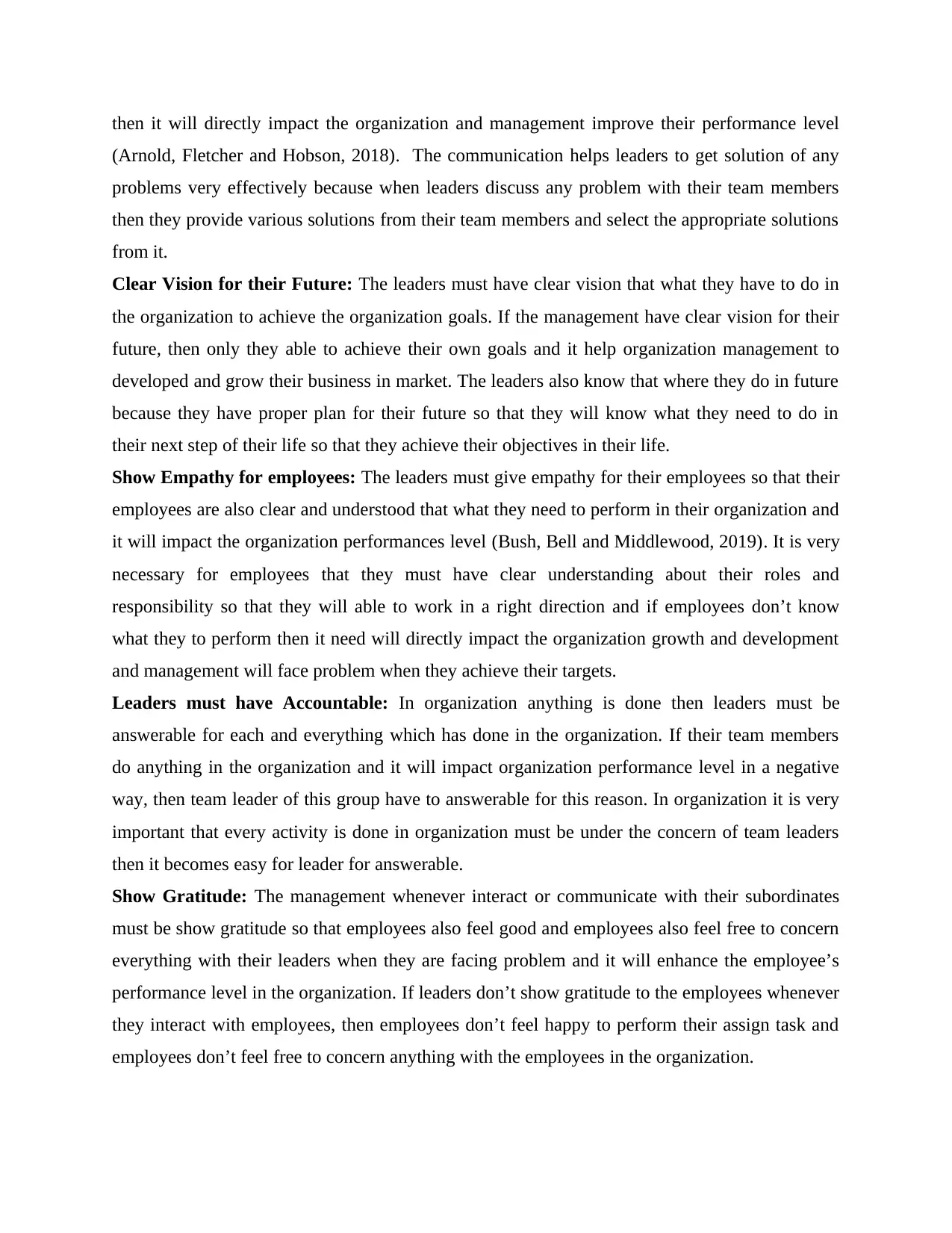
then it will directly impact the organization and management improve their performance level
(Arnold, Fletcher and Hobson, 2018). The communication helps leaders to get solution of any
problems very effectively because when leaders discuss any problem with their team members
then they provide various solutions from their team members and select the appropriate solutions
from it.
Clear Vision for their Future: The leaders must have clear vision that what they have to do in
the organization to achieve the organization goals. If the management have clear vision for their
future, then only they able to achieve their own goals and it help organization management to
developed and grow their business in market. The leaders also know that where they do in future
because they have proper plan for their future so that they will know what they need to do in
their next step of their life so that they achieve their objectives in their life.
Show Empathy for employees: The leaders must give empathy for their employees so that their
employees are also clear and understood that what they need to perform in their organization and
it will impact the organization performances level (Bush, Bell and Middlewood, 2019). It is very
necessary for employees that they must have clear understanding about their roles and
responsibility so that they will able to work in a right direction and if employees don’t know
what they to perform then it need will directly impact the organization growth and development
and management will face problem when they achieve their targets.
Leaders must have Accountable: In organization anything is done then leaders must be
answerable for each and everything which has done in the organization. If their team members
do anything in the organization and it will impact organization performance level in a negative
way, then team leader of this group have to answerable for this reason. In organization it is very
important that every activity is done in organization must be under the concern of team leaders
then it becomes easy for leader for answerable.
Show Gratitude: The management whenever interact or communicate with their subordinates
must be show gratitude so that employees also feel good and employees also feel free to concern
everything with their leaders when they are facing problem and it will enhance the employee’s
performance level in the organization. If leaders don’t show gratitude to the employees whenever
they interact with employees, then employees don’t feel happy to perform their assign task and
employees don’t feel free to concern anything with the employees in the organization.
(Arnold, Fletcher and Hobson, 2018). The communication helps leaders to get solution of any
problems very effectively because when leaders discuss any problem with their team members
then they provide various solutions from their team members and select the appropriate solutions
from it.
Clear Vision for their Future: The leaders must have clear vision that what they have to do in
the organization to achieve the organization goals. If the management have clear vision for their
future, then only they able to achieve their own goals and it help organization management to
developed and grow their business in market. The leaders also know that where they do in future
because they have proper plan for their future so that they will know what they need to do in
their next step of their life so that they achieve their objectives in their life.
Show Empathy for employees: The leaders must give empathy for their employees so that their
employees are also clear and understood that what they need to perform in their organization and
it will impact the organization performances level (Bush, Bell and Middlewood, 2019). It is very
necessary for employees that they must have clear understanding about their roles and
responsibility so that they will able to work in a right direction and if employees don’t know
what they to perform then it need will directly impact the organization growth and development
and management will face problem when they achieve their targets.
Leaders must have Accountable: In organization anything is done then leaders must be
answerable for each and everything which has done in the organization. If their team members
do anything in the organization and it will impact organization performance level in a negative
way, then team leader of this group have to answerable for this reason. In organization it is very
important that every activity is done in organization must be under the concern of team leaders
then it becomes easy for leader for answerable.
Show Gratitude: The management whenever interact or communicate with their subordinates
must be show gratitude so that employees also feel good and employees also feel free to concern
everything with their leaders when they are facing problem and it will enhance the employee’s
performance level in the organization. If leaders don’t show gratitude to the employees whenever
they interact with employees, then employees don’t feel happy to perform their assign task and
employees don’t feel free to concern anything with the employees in the organization.
Paraphrase This Document
Need a fresh take? Get an instant paraphrase of this document with our AI Paraphraser
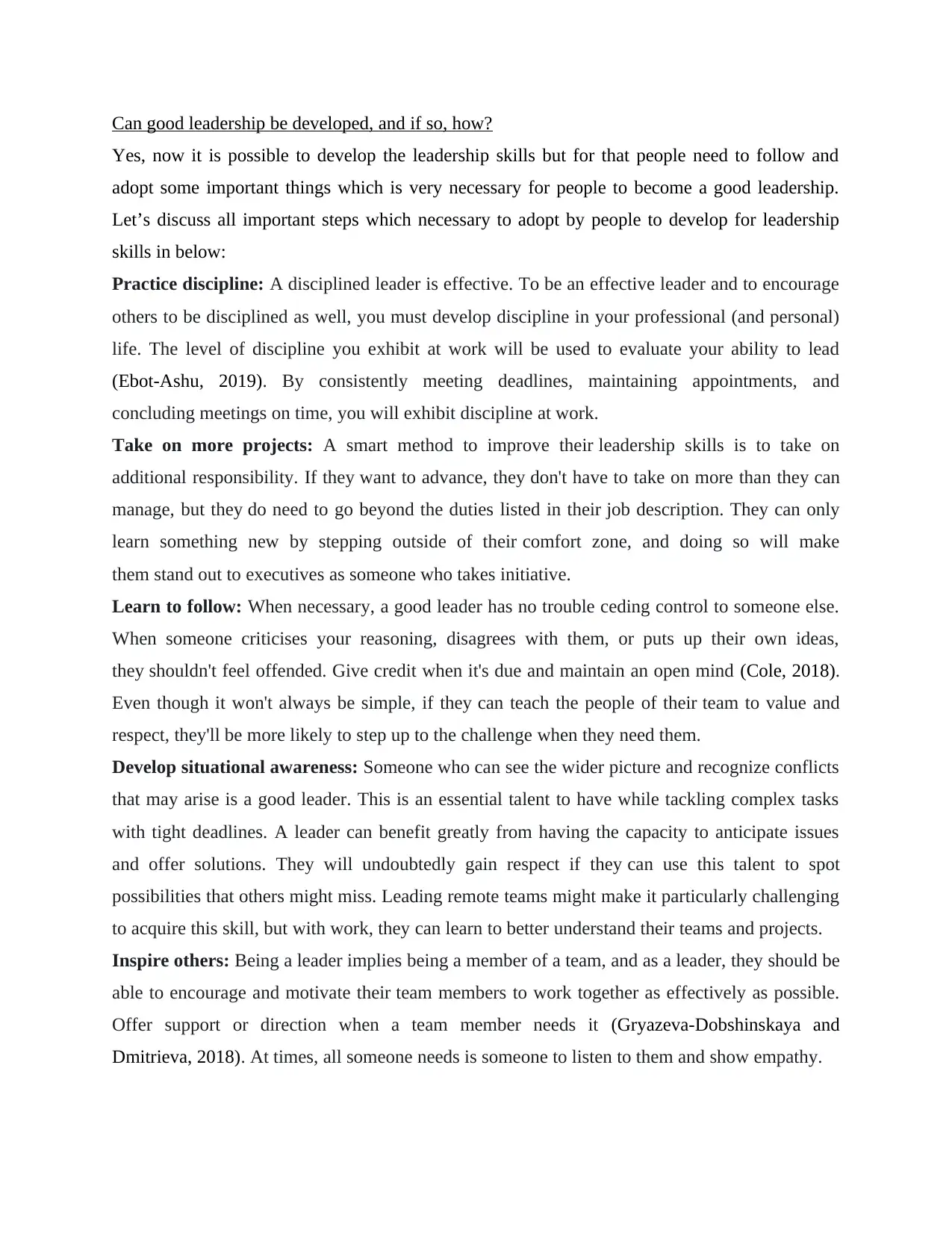
Can good leadership be developed, and if so, how?
Yes, now it is possible to develop the leadership skills but for that people need to follow and
adopt some important things which is very necessary for people to become a good leadership.
Let’s discuss all important steps which necessary to adopt by people to develop for leadership
skills in below:
Practice discipline: A disciplined leader is effective. To be an effective leader and to encourage
others to be disciplined as well, you must develop discipline in your professional (and personal)
life. The level of discipline you exhibit at work will be used to evaluate your ability to lead
(Ebot-Ashu, 2019). By consistently meeting deadlines, maintaining appointments, and
concluding meetings on time, you will exhibit discipline at work.
Take on more projects: A smart method to improve their leadership skills is to take on
additional responsibility. If they want to advance, they don't have to take on more than they can
manage, but they do need to go beyond the duties listed in their job description. They can only
learn something new by stepping outside of their comfort zone, and doing so will make
them stand out to executives as someone who takes initiative.
Learn to follow: When necessary, a good leader has no trouble ceding control to someone else.
When someone criticises your reasoning, disagrees with them, or puts up their own ideas,
they shouldn't feel offended. Give credit when it's due and maintain an open mind (Cole, 2018).
Even though it won't always be simple, if they can teach the people of their team to value and
respect, they'll be more likely to step up to the challenge when they need them.
Develop situational awareness: Someone who can see the wider picture and recognize conflicts
that may arise is a good leader. This is an essential talent to have while tackling complex tasks
with tight deadlines. A leader can benefit greatly from having the capacity to anticipate issues
and offer solutions. They will undoubtedly gain respect if they can use this talent to spot
possibilities that others might miss. Leading remote teams might make it particularly challenging
to acquire this skill, but with work, they can learn to better understand their teams and projects.
Inspire others: Being a leader implies being a member of a team, and as a leader, they should be
able to encourage and motivate their team members to work together as effectively as possible.
Offer support or direction when a team member needs it (Gryazeva-Dobshinskaya and
Dmitrieva, 2018). At times, all someone needs is someone to listen to them and show empathy.
Yes, now it is possible to develop the leadership skills but for that people need to follow and
adopt some important things which is very necessary for people to become a good leadership.
Let’s discuss all important steps which necessary to adopt by people to develop for leadership
skills in below:
Practice discipline: A disciplined leader is effective. To be an effective leader and to encourage
others to be disciplined as well, you must develop discipline in your professional (and personal)
life. The level of discipline you exhibit at work will be used to evaluate your ability to lead
(Ebot-Ashu, 2019). By consistently meeting deadlines, maintaining appointments, and
concluding meetings on time, you will exhibit discipline at work.
Take on more projects: A smart method to improve their leadership skills is to take on
additional responsibility. If they want to advance, they don't have to take on more than they can
manage, but they do need to go beyond the duties listed in their job description. They can only
learn something new by stepping outside of their comfort zone, and doing so will make
them stand out to executives as someone who takes initiative.
Learn to follow: When necessary, a good leader has no trouble ceding control to someone else.
When someone criticises your reasoning, disagrees with them, or puts up their own ideas,
they shouldn't feel offended. Give credit when it's due and maintain an open mind (Cole, 2018).
Even though it won't always be simple, if they can teach the people of their team to value and
respect, they'll be more likely to step up to the challenge when they need them.
Develop situational awareness: Someone who can see the wider picture and recognize conflicts
that may arise is a good leader. This is an essential talent to have while tackling complex tasks
with tight deadlines. A leader can benefit greatly from having the capacity to anticipate issues
and offer solutions. They will undoubtedly gain respect if they can use this talent to spot
possibilities that others might miss. Leading remote teams might make it particularly challenging
to acquire this skill, but with work, they can learn to better understand their teams and projects.
Inspire others: Being a leader implies being a member of a team, and as a leader, they should be
able to encourage and motivate their team members to work together as effectively as possible.
Offer support or direction when a team member needs it (Gryazeva-Dobshinskaya and
Dmitrieva, 2018). At times, all someone needs is someone to listen to them and show empathy.
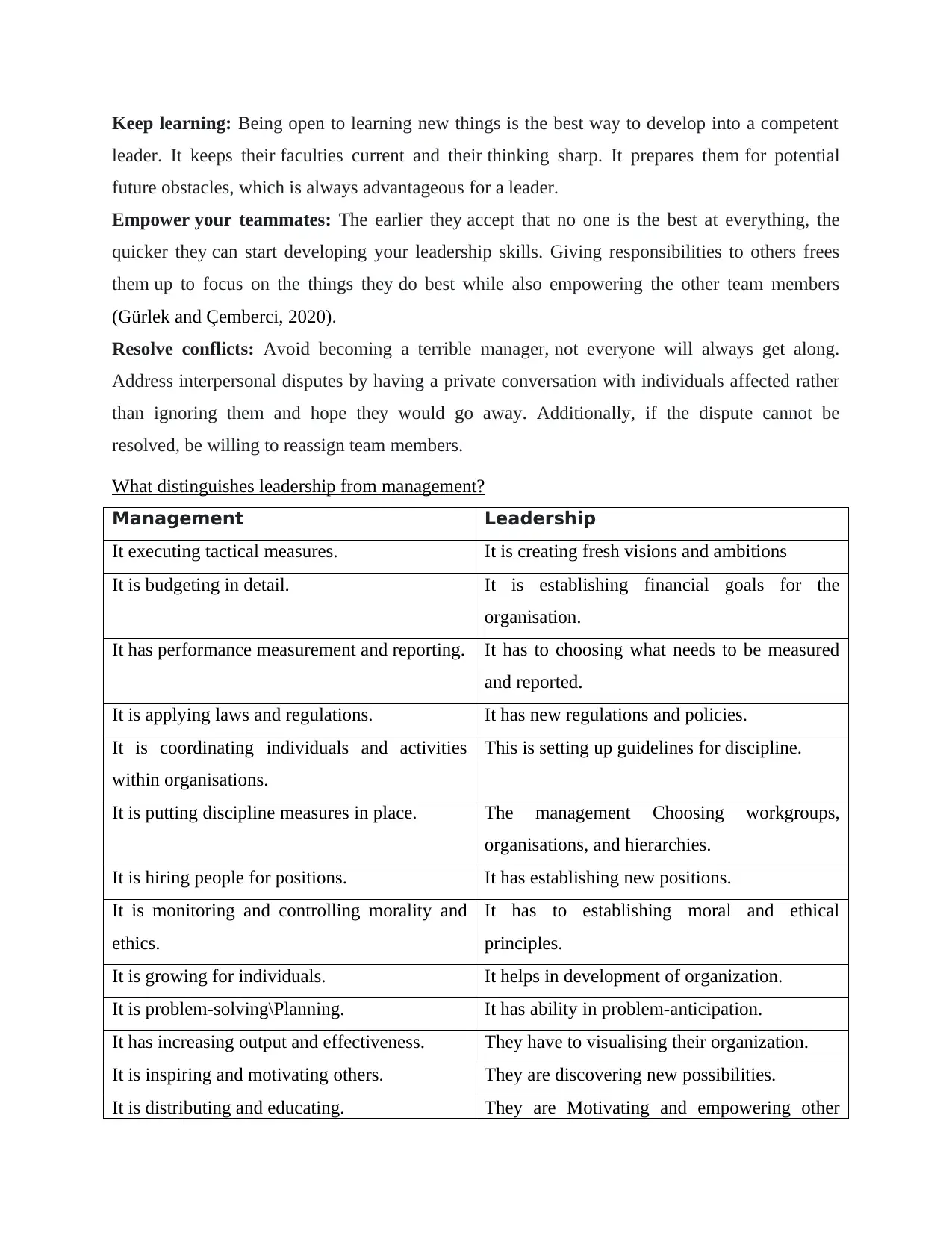
Keep learning: Being open to learning new things is the best way to develop into a competent
leader. It keeps their faculties current and their thinking sharp. It prepares them for potential
future obstacles, which is always advantageous for a leader.
Empower your teammates: The earlier they accept that no one is the best at everything, the
quicker they can start developing your leadership skills. Giving responsibilities to others frees
them up to focus on the things they do best while also empowering the other team members
(Gürlek and Çemberci, 2020).
Resolve conflicts: Avoid becoming a terrible manager, not everyone will always get along.
Address interpersonal disputes by having a private conversation with individuals affected rather
than ignoring them and hope they would go away. Additionally, if the dispute cannot be
resolved, be willing to reassign team members.
What distinguishes leadership from management?
Management Leadership
It executing tactical measures. It is creating fresh visions and ambitions
It is budgeting in detail. It is establishing financial goals for the
organisation.
It has performance measurement and reporting. It has to choosing what needs to be measured
and reported.
It is applying laws and regulations. It has new regulations and policies.
It is coordinating individuals and activities
within organisations.
This is setting up guidelines for discipline.
It is putting discipline measures in place. The management Choosing workgroups,
organisations, and hierarchies.
It is hiring people for positions. It has establishing new positions.
It is monitoring and controlling morality and
ethics.
It has to establishing moral and ethical
principles.
It is growing for individuals. It helps in development of organization.
It is problem-solving\Planning. It has ability in problem-anticipation.
It has increasing output and effectiveness. They have to visualising their organization.
It is inspiring and motivating others. They are discovering new possibilities.
It is distributing and educating. They are Motivating and empowering other
leader. It keeps their faculties current and their thinking sharp. It prepares them for potential
future obstacles, which is always advantageous for a leader.
Empower your teammates: The earlier they accept that no one is the best at everything, the
quicker they can start developing your leadership skills. Giving responsibilities to others frees
them up to focus on the things they do best while also empowering the other team members
(Gürlek and Çemberci, 2020).
Resolve conflicts: Avoid becoming a terrible manager, not everyone will always get along.
Address interpersonal disputes by having a private conversation with individuals affected rather
than ignoring them and hope they would go away. Additionally, if the dispute cannot be
resolved, be willing to reassign team members.
What distinguishes leadership from management?
Management Leadership
It executing tactical measures. It is creating fresh visions and ambitions
It is budgeting in detail. It is establishing financial goals for the
organisation.
It has performance measurement and reporting. It has to choosing what needs to be measured
and reported.
It is applying laws and regulations. It has new regulations and policies.
It is coordinating individuals and activities
within organisations.
This is setting up guidelines for discipline.
It is putting discipline measures in place. The management Choosing workgroups,
organisations, and hierarchies.
It is hiring people for positions. It has establishing new positions.
It is monitoring and controlling morality and
ethics.
It has to establishing moral and ethical
principles.
It is growing for individuals. It helps in development of organization.
It is problem-solving\Planning. It has ability in problem-anticipation.
It has increasing output and effectiveness. They have to visualising their organization.
It is inspiring and motivating others. They are discovering new possibilities.
It is distributing and educating. They are Motivating and empowering other
⊘ This is a preview!⊘
Do you want full access?
Subscribe today to unlock all pages.

Trusted by 1+ million students worldwide
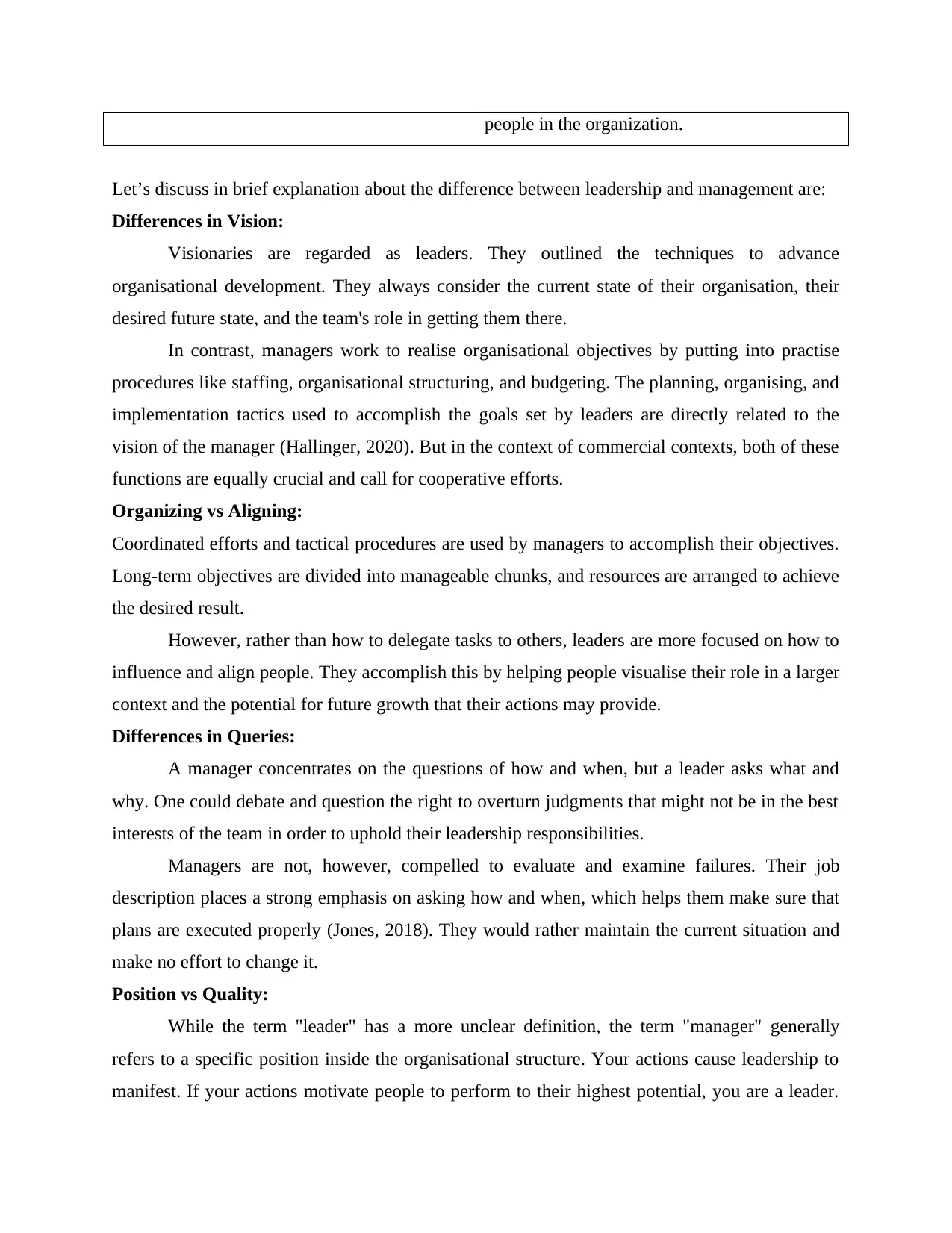
people in the organization.
Let’s discuss in brief explanation about the difference between leadership and management are:
Differences in Vision:
Visionaries are regarded as leaders. They outlined the techniques to advance
organisational development. They always consider the current state of their organisation, their
desired future state, and the team's role in getting them there.
In contrast, managers work to realise organisational objectives by putting into practise
procedures like staffing, organisational structuring, and budgeting. The planning, organising, and
implementation tactics used to accomplish the goals set by leaders are directly related to the
vision of the manager (Hallinger, 2020). But in the context of commercial contexts, both of these
functions are equally crucial and call for cooperative efforts.
Organizing vs Aligning:
Coordinated efforts and tactical procedures are used by managers to accomplish their objectives.
Long-term objectives are divided into manageable chunks, and resources are arranged to achieve
the desired result.
However, rather than how to delegate tasks to others, leaders are more focused on how to
influence and align people. They accomplish this by helping people visualise their role in a larger
context and the potential for future growth that their actions may provide.
Differences in Queries:
A manager concentrates on the questions of how and when, but a leader asks what and
why. One could debate and question the right to overturn judgments that might not be in the best
interests of the team in order to uphold their leadership responsibilities.
Managers are not, however, compelled to evaluate and examine failures. Their job
description places a strong emphasis on asking how and when, which helps them make sure that
plans are executed properly (Jones, 2018). They would rather maintain the current situation and
make no effort to change it.
Position vs Quality:
While the term "leader" has a more unclear definition, the term "manager" generally
refers to a specific position inside the organisational structure. Your actions cause leadership to
manifest. If your actions motivate people to perform to their highest potential, you are a leader.
Let’s discuss in brief explanation about the difference between leadership and management are:
Differences in Vision:
Visionaries are regarded as leaders. They outlined the techniques to advance
organisational development. They always consider the current state of their organisation, their
desired future state, and the team's role in getting them there.
In contrast, managers work to realise organisational objectives by putting into practise
procedures like staffing, organisational structuring, and budgeting. The planning, organising, and
implementation tactics used to accomplish the goals set by leaders are directly related to the
vision of the manager (Hallinger, 2020). But in the context of commercial contexts, both of these
functions are equally crucial and call for cooperative efforts.
Organizing vs Aligning:
Coordinated efforts and tactical procedures are used by managers to accomplish their objectives.
Long-term objectives are divided into manageable chunks, and resources are arranged to achieve
the desired result.
However, rather than how to delegate tasks to others, leaders are more focused on how to
influence and align people. They accomplish this by helping people visualise their role in a larger
context and the potential for future growth that their actions may provide.
Differences in Queries:
A manager concentrates on the questions of how and when, but a leader asks what and
why. One could debate and question the right to overturn judgments that might not be in the best
interests of the team in order to uphold their leadership responsibilities.
Managers are not, however, compelled to evaluate and examine failures. Their job
description places a strong emphasis on asking how and when, which helps them make sure that
plans are executed properly (Jones, 2018). They would rather maintain the current situation and
make no effort to change it.
Position vs Quality:
While the term "leader" has a more unclear definition, the term "manager" generally
refers to a specific position inside the organisational structure. Your actions cause leadership to
manifest. If your actions motivate people to perform to their highest potential, you are a leader.
Paraphrase This Document
Need a fresh take? Get an instant paraphrase of this document with our AI Paraphraser
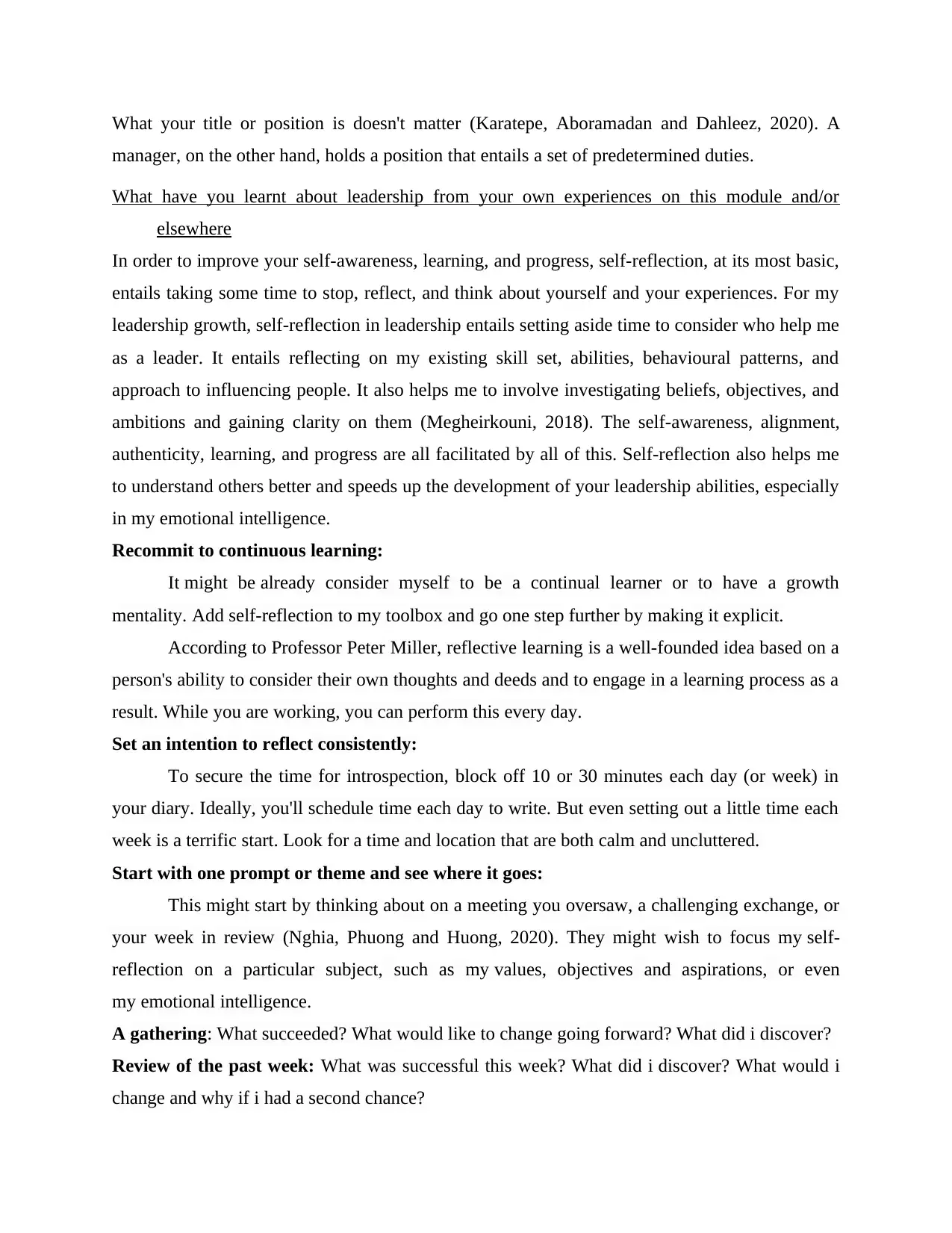
What your title or position is doesn't matter (Karatepe, Aboramadan and Dahleez, 2020). A
manager, on the other hand, holds a position that entails a set of predetermined duties.
What have you learnt about leadership from your own experiences on this module and/or
elsewhere
In order to improve your self-awareness, learning, and progress, self-reflection, at its most basic,
entails taking some time to stop, reflect, and think about yourself and your experiences. For my
leadership growth, self-reflection in leadership entails setting aside time to consider who help me
as a leader. It entails reflecting on my existing skill set, abilities, behavioural patterns, and
approach to influencing people. It also helps me to involve investigating beliefs, objectives, and
ambitions and gaining clarity on them (Megheirkouni, 2018). The self-awareness, alignment,
authenticity, learning, and progress are all facilitated by all of this. Self-reflection also helps me
to understand others better and speeds up the development of your leadership abilities, especially
in my emotional intelligence.
Recommit to continuous learning:
It might be already consider myself to be a continual learner or to have a growth
mentality. Add self-reflection to my toolbox and go one step further by making it explicit.
According to Professor Peter Miller, reflective learning is a well-founded idea based on a
person's ability to consider their own thoughts and deeds and to engage in a learning process as a
result. While you are working, you can perform this every day.
Set an intention to reflect consistently:
To secure the time for introspection, block off 10 or 30 minutes each day (or week) in
your diary. Ideally, you'll schedule time each day to write. But even setting out a little time each
week is a terrific start. Look for a time and location that are both calm and uncluttered.
Start with one prompt or theme and see where it goes:
This might start by thinking about on a meeting you oversaw, a challenging exchange, or
your week in review (Nghia, Phuong and Huong, 2020). They might wish to focus my self-
reflection on a particular subject, such as my values, objectives and aspirations, or even
my emotional intelligence.
A gathering: What succeeded? What would like to change going forward? What did i discover?
Review of the past week: What was successful this week? What did i discover? What would i
change and why if i had a second chance?
manager, on the other hand, holds a position that entails a set of predetermined duties.
What have you learnt about leadership from your own experiences on this module and/or
elsewhere
In order to improve your self-awareness, learning, and progress, self-reflection, at its most basic,
entails taking some time to stop, reflect, and think about yourself and your experiences. For my
leadership growth, self-reflection in leadership entails setting aside time to consider who help me
as a leader. It entails reflecting on my existing skill set, abilities, behavioural patterns, and
approach to influencing people. It also helps me to involve investigating beliefs, objectives, and
ambitions and gaining clarity on them (Megheirkouni, 2018). The self-awareness, alignment,
authenticity, learning, and progress are all facilitated by all of this. Self-reflection also helps me
to understand others better and speeds up the development of your leadership abilities, especially
in my emotional intelligence.
Recommit to continuous learning:
It might be already consider myself to be a continual learner or to have a growth
mentality. Add self-reflection to my toolbox and go one step further by making it explicit.
According to Professor Peter Miller, reflective learning is a well-founded idea based on a
person's ability to consider their own thoughts and deeds and to engage in a learning process as a
result. While you are working, you can perform this every day.
Set an intention to reflect consistently:
To secure the time for introspection, block off 10 or 30 minutes each day (or week) in
your diary. Ideally, you'll schedule time each day to write. But even setting out a little time each
week is a terrific start. Look for a time and location that are both calm and uncluttered.
Start with one prompt or theme and see where it goes:
This might start by thinking about on a meeting you oversaw, a challenging exchange, or
your week in review (Nghia, Phuong and Huong, 2020). They might wish to focus my self-
reflection on a particular subject, such as my values, objectives and aspirations, or even
my emotional intelligence.
A gathering: What succeeded? What would like to change going forward? What did i discover?
Review of the past week: What was successful this week? What did i discover? What would i
change and why if i had a second chance?
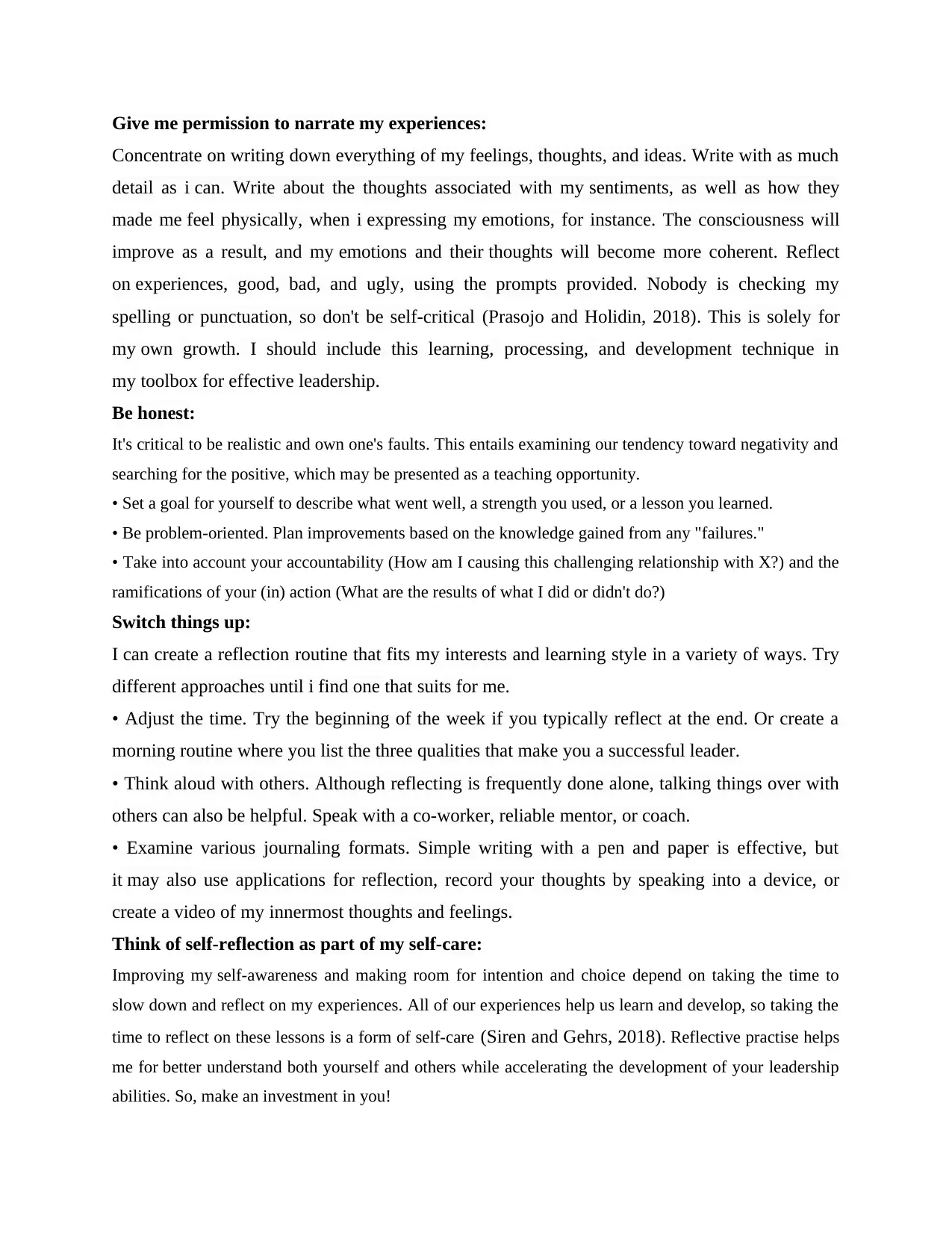
Give me permission to narrate my experiences:
Concentrate on writing down everything of my feelings, thoughts, and ideas. Write with as much
detail as i can. Write about the thoughts associated with my sentiments, as well as how they
made me feel physically, when i expressing my emotions, for instance. The consciousness will
improve as a result, and my emotions and their thoughts will become more coherent. Reflect
on experiences, good, bad, and ugly, using the prompts provided. Nobody is checking my
spelling or punctuation, so don't be self-critical (Prasojo and Holidin, 2018). This is solely for
my own growth. I should include this learning, processing, and development technique in
my toolbox for effective leadership.
Be honest:
It's critical to be realistic and own one's faults. This entails examining our tendency toward negativity and
searching for the positive, which may be presented as a teaching opportunity.
• Set a goal for yourself to describe what went well, a strength you used, or a lesson you learned.
• Be problem-oriented. Plan improvements based on the knowledge gained from any "failures."
• Take into account your accountability (How am I causing this challenging relationship with X?) and the
ramifications of your (in) action (What are the results of what I did or didn't do?)
Switch things up:
I can create a reflection routine that fits my interests and learning style in a variety of ways. Try
different approaches until i find one that suits for me.
• Adjust the time. Try the beginning of the week if you typically reflect at the end. Or create a
morning routine where you list the three qualities that make you a successful leader.
• Think aloud with others. Although reflecting is frequently done alone, talking things over with
others can also be helpful. Speak with a co-worker, reliable mentor, or coach.
• Examine various journaling formats. Simple writing with a pen and paper is effective, but
it may also use applications for reflection, record your thoughts by speaking into a device, or
create a video of my innermost thoughts and feelings.
Think of self-reflection as part of my self-care:
Improving my self-awareness and making room for intention and choice depend on taking the time to
slow down and reflect on my experiences. All of our experiences help us learn and develop, so taking the
time to reflect on these lessons is a form of self-care (Siren and Gehrs, 2018). Reflective practise helps
me for better understand both yourself and others while accelerating the development of your leadership
abilities. So, make an investment in you!
Concentrate on writing down everything of my feelings, thoughts, and ideas. Write with as much
detail as i can. Write about the thoughts associated with my sentiments, as well as how they
made me feel physically, when i expressing my emotions, for instance. The consciousness will
improve as a result, and my emotions and their thoughts will become more coherent. Reflect
on experiences, good, bad, and ugly, using the prompts provided. Nobody is checking my
spelling or punctuation, so don't be self-critical (Prasojo and Holidin, 2018). This is solely for
my own growth. I should include this learning, processing, and development technique in
my toolbox for effective leadership.
Be honest:
It's critical to be realistic and own one's faults. This entails examining our tendency toward negativity and
searching for the positive, which may be presented as a teaching opportunity.
• Set a goal for yourself to describe what went well, a strength you used, or a lesson you learned.
• Be problem-oriented. Plan improvements based on the knowledge gained from any "failures."
• Take into account your accountability (How am I causing this challenging relationship with X?) and the
ramifications of your (in) action (What are the results of what I did or didn't do?)
Switch things up:
I can create a reflection routine that fits my interests and learning style in a variety of ways. Try
different approaches until i find one that suits for me.
• Adjust the time. Try the beginning of the week if you typically reflect at the end. Or create a
morning routine where you list the three qualities that make you a successful leader.
• Think aloud with others. Although reflecting is frequently done alone, talking things over with
others can also be helpful. Speak with a co-worker, reliable mentor, or coach.
• Examine various journaling formats. Simple writing with a pen and paper is effective, but
it may also use applications for reflection, record your thoughts by speaking into a device, or
create a video of my innermost thoughts and feelings.
Think of self-reflection as part of my self-care:
Improving my self-awareness and making room for intention and choice depend on taking the time to
slow down and reflect on my experiences. All of our experiences help us learn and develop, so taking the
time to reflect on these lessons is a form of self-care (Siren and Gehrs, 2018). Reflective practise helps
me for better understand both yourself and others while accelerating the development of your leadership
abilities. So, make an investment in you!
⊘ This is a preview!⊘
Do you want full access?
Subscribe today to unlock all pages.

Trusted by 1+ million students worldwide

Paraphrase This Document
Need a fresh take? Get an instant paraphrase of this document with our AI Paraphraser
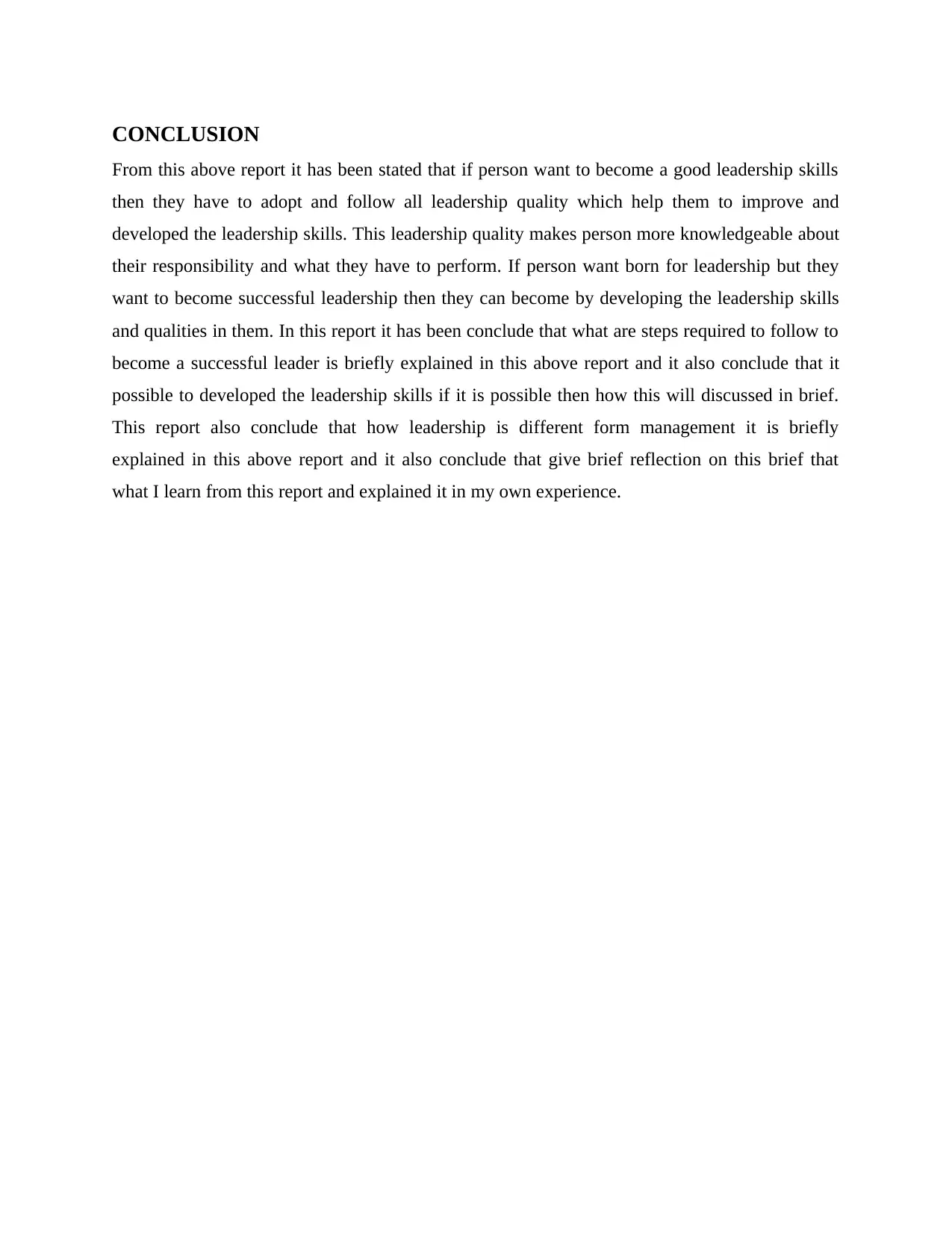
CONCLUSION
From this above report it has been stated that if person want to become a good leadership skills
then they have to adopt and follow all leadership quality which help them to improve and
developed the leadership skills. This leadership quality makes person more knowledgeable about
their responsibility and what they have to perform. If person want born for leadership but they
want to become successful leadership then they can become by developing the leadership skills
and qualities in them. In this report it has been conclude that what are steps required to follow to
become a successful leader is briefly explained in this above report and it also conclude that it
possible to developed the leadership skills if it is possible then how this will discussed in brief.
This report also conclude that how leadership is different form management it is briefly
explained in this above report and it also conclude that give brief reflection on this brief that
what I learn from this report and explained it in my own experience.
From this above report it has been stated that if person want to become a good leadership skills
then they have to adopt and follow all leadership quality which help them to improve and
developed the leadership skills. This leadership quality makes person more knowledgeable about
their responsibility and what they have to perform. If person want born for leadership but they
want to become successful leadership then they can become by developing the leadership skills
and qualities in them. In this report it has been conclude that what are steps required to follow to
become a successful leader is briefly explained in this above report and it also conclude that it
possible to developed the leadership skills if it is possible then how this will discussed in brief.
This report also conclude that how leadership is different form management it is briefly
explained in this above report and it also conclude that give brief reflection on this brief that
what I learn from this report and explained it in my own experience.
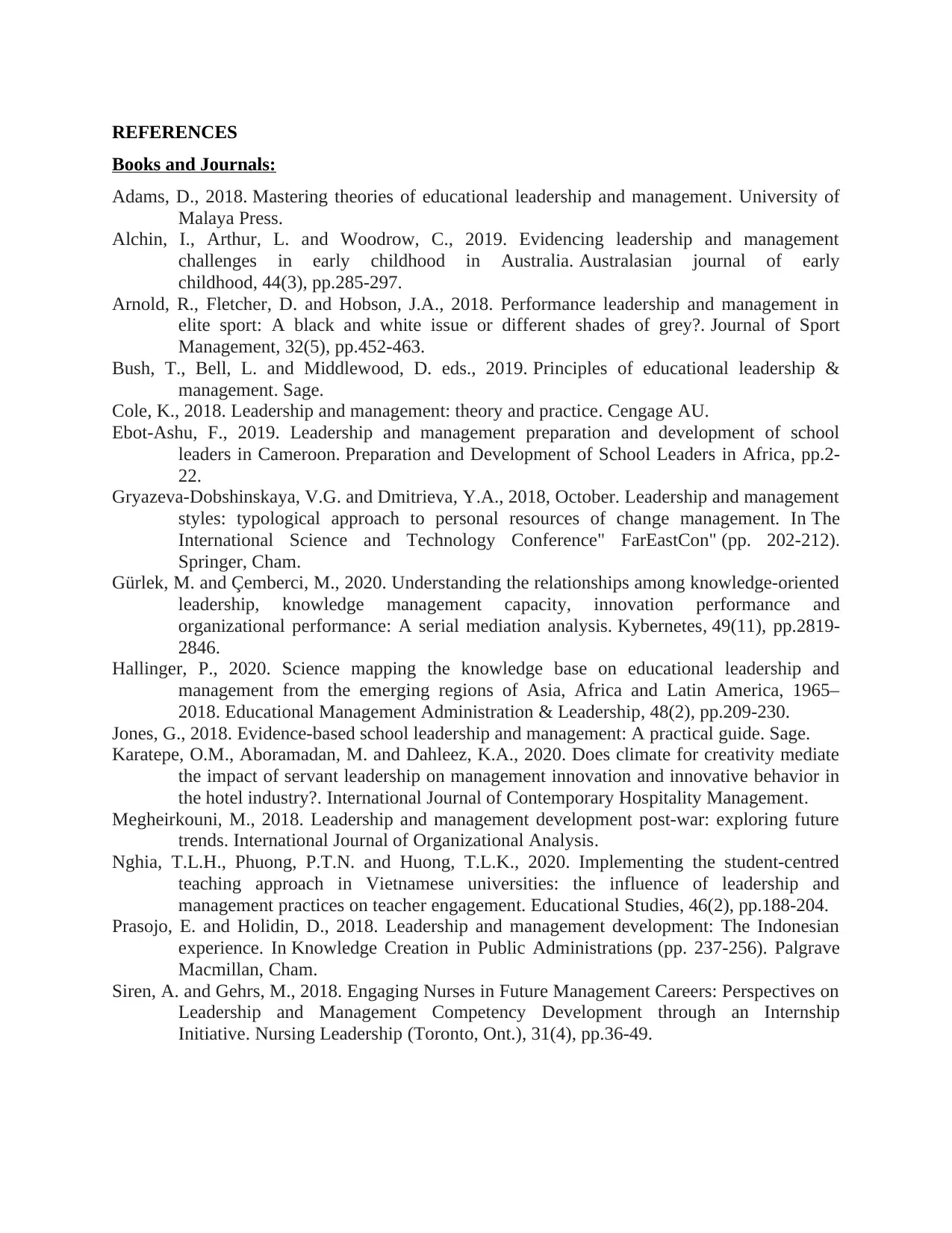
REFERENCES
Books and Journals:
Adams, D., 2018. Mastering theories of educational leadership and management. University of
Malaya Press.
Alchin, I., Arthur, L. and Woodrow, C., 2019. Evidencing leadership and management
challenges in early childhood in Australia. Australasian journal of early
childhood, 44(3), pp.285-297.
Arnold, R., Fletcher, D. and Hobson, J.A., 2018. Performance leadership and management in
elite sport: A black and white issue or different shades of grey?. Journal of Sport
Management, 32(5), pp.452-463.
Bush, T., Bell, L. and Middlewood, D. eds., 2019. Principles of educational leadership &
management. Sage.
Cole, K., 2018. Leadership and management: theory and practice. Cengage AU.
Ebot-Ashu, F., 2019. Leadership and management preparation and development of school
leaders in Cameroon. Preparation and Development of School Leaders in Africa, pp.2-
22.
Gryazeva-Dobshinskaya, V.G. and Dmitrieva, Y.A., 2018, October. Leadership and management
styles: typological approach to personal resources of change management. In The
International Science and Technology Conference" FarEastСon" (pp. 202-212).
Springer, Cham.
Gürlek, M. and Çemberci, M., 2020. Understanding the relationships among knowledge-oriented
leadership, knowledge management capacity, innovation performance and
organizational performance: A serial mediation analysis. Kybernetes, 49(11), pp.2819-
2846.
Hallinger, P., 2020. Science mapping the knowledge base on educational leadership and
management from the emerging regions of Asia, Africa and Latin America, 1965–
2018. Educational Management Administration & Leadership, 48(2), pp.209-230.
Jones, G., 2018. Evidence-based school leadership and management: A practical guide. Sage.
Karatepe, O.M., Aboramadan, M. and Dahleez, K.A., 2020. Does climate for creativity mediate
the impact of servant leadership on management innovation and innovative behavior in
the hotel industry?. International Journal of Contemporary Hospitality Management.
Megheirkouni, M., 2018. Leadership and management development post-war: exploring future
trends. International Journal of Organizational Analysis.
Nghia, T.L.H., Phuong, P.T.N. and Huong, T.L.K., 2020. Implementing the student-centred
teaching approach in Vietnamese universities: the influence of leadership and
management practices on teacher engagement. Educational Studies, 46(2), pp.188-204.
Prasojo, E. and Holidin, D., 2018. Leadership and management development: The Indonesian
experience. In Knowledge Creation in Public Administrations (pp. 237-256). Palgrave
Macmillan, Cham.
Siren, A. and Gehrs, M., 2018. Engaging Nurses in Future Management Careers: Perspectives on
Leadership and Management Competency Development through an Internship
Initiative. Nursing Leadership (Toronto, Ont.), 31(4), pp.36-49.
Books and Journals:
Adams, D., 2018. Mastering theories of educational leadership and management. University of
Malaya Press.
Alchin, I., Arthur, L. and Woodrow, C., 2019. Evidencing leadership and management
challenges in early childhood in Australia. Australasian journal of early
childhood, 44(3), pp.285-297.
Arnold, R., Fletcher, D. and Hobson, J.A., 2018. Performance leadership and management in
elite sport: A black and white issue or different shades of grey?. Journal of Sport
Management, 32(5), pp.452-463.
Bush, T., Bell, L. and Middlewood, D. eds., 2019. Principles of educational leadership &
management. Sage.
Cole, K., 2018. Leadership and management: theory and practice. Cengage AU.
Ebot-Ashu, F., 2019. Leadership and management preparation and development of school
leaders in Cameroon. Preparation and Development of School Leaders in Africa, pp.2-
22.
Gryazeva-Dobshinskaya, V.G. and Dmitrieva, Y.A., 2018, October. Leadership and management
styles: typological approach to personal resources of change management. In The
International Science and Technology Conference" FarEastСon" (pp. 202-212).
Springer, Cham.
Gürlek, M. and Çemberci, M., 2020. Understanding the relationships among knowledge-oriented
leadership, knowledge management capacity, innovation performance and
organizational performance: A serial mediation analysis. Kybernetes, 49(11), pp.2819-
2846.
Hallinger, P., 2020. Science mapping the knowledge base on educational leadership and
management from the emerging regions of Asia, Africa and Latin America, 1965–
2018. Educational Management Administration & Leadership, 48(2), pp.209-230.
Jones, G., 2018. Evidence-based school leadership and management: A practical guide. Sage.
Karatepe, O.M., Aboramadan, M. and Dahleez, K.A., 2020. Does climate for creativity mediate
the impact of servant leadership on management innovation and innovative behavior in
the hotel industry?. International Journal of Contemporary Hospitality Management.
Megheirkouni, M., 2018. Leadership and management development post-war: exploring future
trends. International Journal of Organizational Analysis.
Nghia, T.L.H., Phuong, P.T.N. and Huong, T.L.K., 2020. Implementing the student-centred
teaching approach in Vietnamese universities: the influence of leadership and
management practices on teacher engagement. Educational Studies, 46(2), pp.188-204.
Prasojo, E. and Holidin, D., 2018. Leadership and management development: The Indonesian
experience. In Knowledge Creation in Public Administrations (pp. 237-256). Palgrave
Macmillan, Cham.
Siren, A. and Gehrs, M., 2018. Engaging Nurses in Future Management Careers: Perspectives on
Leadership and Management Competency Development through an Internship
Initiative. Nursing Leadership (Toronto, Ont.), 31(4), pp.36-49.
⊘ This is a preview!⊘
Do you want full access?
Subscribe today to unlock all pages.

Trusted by 1+ million students worldwide
1 out of 12
Related Documents
Your All-in-One AI-Powered Toolkit for Academic Success.
+13062052269
info@desklib.com
Available 24*7 on WhatsApp / Email
![[object Object]](/_next/static/media/star-bottom.7253800d.svg)
Unlock your academic potential
Copyright © 2020–2025 A2Z Services. All Rights Reserved. Developed and managed by ZUCOL.





